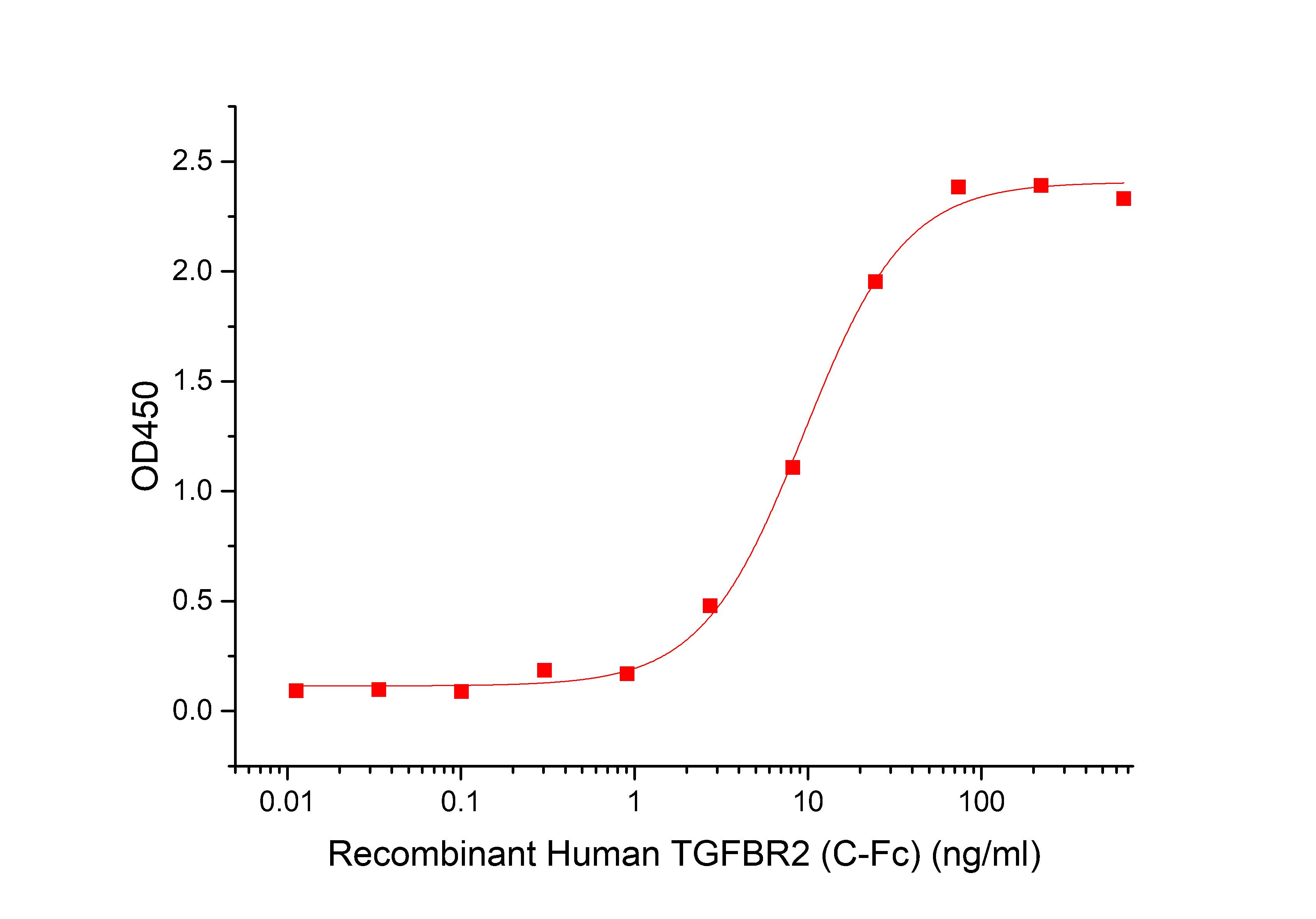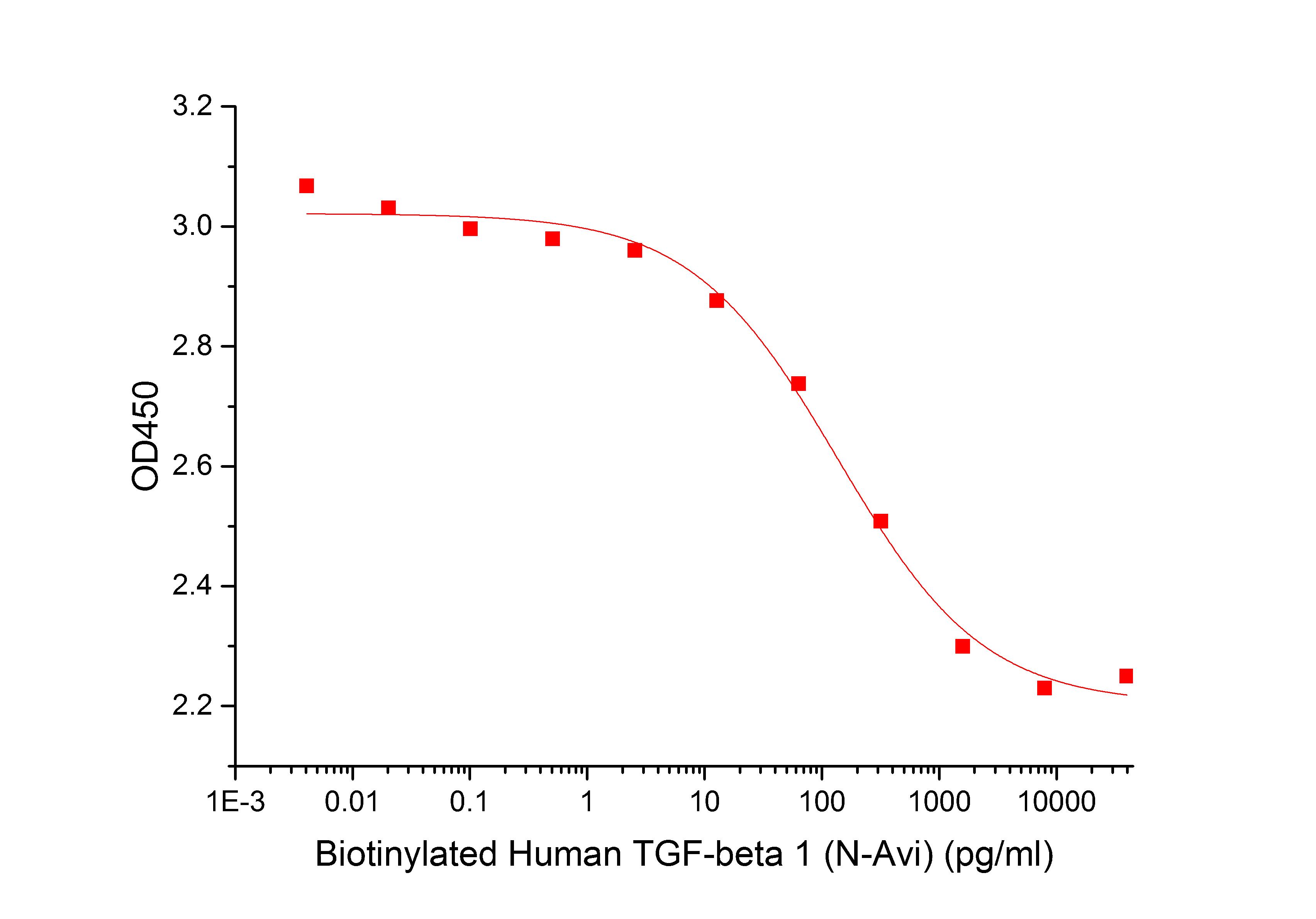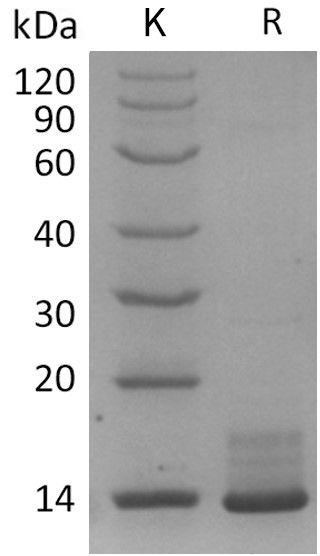- Remove All
 Your shopping cart is currently empty
Your shopping cart is currently empty
Shopping Cart
TGF beta 1 Protein, Human, Recombinant (Avi), Biotinylated
Catalog No. TMPJ-00249
Transforming Growth Factor β-1 (TGFβ-1) is a secreted protein which belongs to the TGF-β family. TGFβ-1 is abundantly expressed in bone, articular cartilage and chondrocytes and is increased in osteoarthritis (OA). TGFβ-1 performs many cellular functions, including the control of cell growth, cell proliferation, cell differentiation and apoptosis. The precursor is cleaved into a latency-associated peptide (LAP) and a mature TGFβ-1 peptide. TGFβ-1 may also form heterodimers with other TGFβ family members. It has been found that TGFβ-1 is frequently upregulated in tumor cells. Mutations in this gene results in Camurati-Engelmann disease.

TGF beta 1 Protein, Human, Recombinant (Avi), Biotinylated
Catalog No. TMPJ-00249
Transforming Growth Factor β-1 (TGFβ-1) is a secreted protein which belongs to the TGF-β family. TGFβ-1 is abundantly expressed in bone, articular cartilage and chondrocytes and is increased in osteoarthritis (OA). TGFβ-1 performs many cellular functions, including the control of cell growth, cell proliferation, cell differentiation and apoptosis. The precursor is cleaved into a latency-associated peptide (LAP) and a mature TGFβ-1 peptide. TGFβ-1 may also form heterodimers with other TGFβ family members. It has been found that TGFβ-1 is frequently upregulated in tumor cells. Mutations in this gene results in Camurati-Engelmann disease.
| Pack Size | Price | Availability | Quantity |
|---|---|---|---|
| 20 μg | $579 | In Stock | |
| 100 μg | $1,600 | 7-10 days |
Bulk & Custom
Add to Cart
Select Batch
Resource Download
Product Information
| Biological Activity | 1. Measured by its ability to inhibit TGF-beta 1 activity on TF‑1 human erythroleukemic cells. The ED50 for this effect is 137.37pg/ml. (Regularly tested)
2. Immobilized Biotinylated Human TGF-beta 1-Avi at 2μg/ml (100 μl/well) can bind Human TGFBR2-Fc. The ED50 of Human TGFBR2-Fc is 9.47ng/ml. (Regularly tested)   |
| Description | Transforming Growth Factor β-1 (TGFβ-1) is a secreted protein which belongs to the TGF-β family. TGFβ-1 is abundantly expressed in bone, articular cartilage and chondrocytes and is increased in osteoarthritis (OA). TGFβ-1 performs many cellular functions, including the control of cell growth, cell proliferation, cell differentiation and apoptosis. The precursor is cleaved into a latency-associated peptide (LAP) and a mature TGFβ-1 peptide. TGFβ-1 may also form heterodimers with other TGFβ family members. It has been found that TGFβ-1 is frequently upregulated in tumor cells. Mutations in this gene results in Camurati-Engelmann disease. |
| Species | Human |
| Expression System | HEK293 Cells |
| Tag | N-Avi |
| Accession Number | P01137 |
| Synonyms | Transforming Growth Factor β-1,Transforming Growth Factor Beta-1,TGF-β-1,TGF-β1,TGF-Beta-1,TGFB1,TGFB,Latency-Associated Peptide,LAP |
| Amino Acid | Ala279-Ser390 |
| Construction | Ala279-Ser390 |
| Protein Purity | Greater than 95% as determined by reducing SDS-PAGE. (QC verified)  |
| Molecular Weight | 12-18 KDa (reducing condition) |
| Endotoxin | < 10 EU/mg of the protein as determined by the LAL method. |
| Formulation | Lyophilized from a solution filtered through a 0.22 μm filter, containing 50 mM Glycine-HCl, 150 mM NaCl, pH2.5. |
| Reconstitution | Reconstitute the lyophilized protein in distilled water. The product concentration should not be less than 100 μg/ml. Before opening, centrifuge the tube to collect powder at the bottom. After adding the reconstitution buffer, avoid vortexing or pipetting for mixing. |
| Stability & Storage | Lyophilized powders can be stably stored for over 12 months, while liquid products can be stored for 6-12 months at -80°C. For reconstituted protein solutions, the solution can be stored at -20°C to -80°C for at least 3 months. Please avoid multiple freeze-thaw cycles and store products in aliquots. |
| Shipping | In general, Lyophilized powders are shipping with blue ice. Solutions are shipping with dry ice. |
| Research Background | Transforming Growth Factor β-1 (TGFβ-1) is a secreted protein which belongs to the TGF-β family. TGFβ-1 is abundantly expressed in bone, articular cartilage and chondrocytes and is increased in osteoarthritis (OA). TGFβ-1 performs many cellular functions, including the control of cell growth, cell proliferation, cell differentiation and apoptosis. The precursor is cleaved into a latency-associated peptide (LAP) and a mature TGFβ-1 peptide. TGFβ-1 may also form heterodimers with other TGFβ family members. It has been found that TGFβ-1 is frequently upregulated in tumor cells. Mutations in this gene results in Camurati-Engelmann disease. |
Dose Conversion
You can also refer to dose conversion for different animals. More
Calculator
Tech Support
Please read the User Guide of Recombinant Proteins for more specific information.

Copyright © 2015-2025 TargetMol Chemicals Inc. All Rights Reserved.


